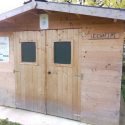Emmanuel Macron, the wolves’ gravedigger: another retrograde stance in Roquefort!
Emmanuel Macron, the wolves’ gravedigger: another retrograde stance in Roquefort!
04.07.2025
Emmanuel Macron, the wolves’ gravedigger: another retrograde stance in Roquefort!
Wildlife
Emmanuel Macron’s latest major project for animals? To “prevent the establishment of wolves where there is pastoralism”, even if it means “removing more wolves”. In order to promote, instead, the establishment of destructive agriculture, fuelled by pesticides, each more toxic than the last. We intend to call to mind a few truths about wolves, who do far more for the balance of our ecosystems than our public authorities and those who claim to “love” nature.
What a disgrace! President Macron’s second five-year term is a war on biodiversity to the bitter end, even in the wake of an unprecedented heatwave. Throughout his terms of office, he has behaved like the gravedigger of wolves and all wild animals, pandering to the livestock and hunting lobbies. His trip to Roquefort and his speech there on Thursday, July 3, 2025 are only the most recent expressions of this.
Death as the only solution… Spoiler: it’s not even effective!
The prefect coordinating the National Action Plan on wolves has already expressed her concern that an “unprecedented number” of wolves have already been killed in France at this time of year. The Head of State, on the other hand, chose to add fuel to the fire.
“We mustn’t wait until it [wolves, editor’s note] has settled in, until you’ve made all the investments, before we can harvest”. Using a filthy technocratic vocabulary (“to harvest”, he says…), Emmanuel Macron assumes the role of leading proponent of the eradication of wild animals, wolves in the first place. With these words, he is admitting his own failure: making farmers believe that culling is the only solution, not cohabitation. Killing has been made easier for several months now, with ministerial decrees each more hypocritical than the last.
A stupid and wicked policy
Systematic shooting does nothing to resolve the anger of breeders! Scientists are unanimous: in Spain and Michigan (USA), they found that shooting led to an increase in predation in subsequent years and in the surrounding area. In France, this ineffective and deadly policy has been practiced for years…
Wolves are our allies, like all living creatures
Political power’s disconnect from reality is reaching new heights. Emmanuel Macron is a bad pupil and a good demagogue: he claims that the wolves have been reintroduced, an appalling lie from a president. He would do better to listen to the eight out of ten French people (Ipsos/One Voice poll, November 2024) who believe that wolves have their rightful place in the wild. Though their detractors may not like it.
Tracking down every newcomer in the departments, like Camille in the Saône-et-Loire region and Milo and Mina in the Corrèze region, will solve nothing.
State rhetoric is largely inspired by the nauseating rhetoric of lobbies. Hunters in the Alpes-Maritimes region claim that wolves threaten wildlife. You can’t make this up, coming from those who slaughter wild animals at every turn. Are they afraid that wolves are much better than they are at their so-called mission of “regulation”?
The facts are there: in the Netherlands, it has been shown that wolves prefer wild ungulates such as roe deer and wild boars. Around Mont Ventoux, they have helped to regenerate forests. In Poland, they are a welcome sight, “regulating” deer and wild boars in the fields.
Fires and soil erosion, the consequences of unbridled pastoralism
The main culprits in the degradation of nature are intensive activities, of which unbridled pastoralism is one. The lobbyists have certainly done their homework! Emmanuel Macron seems to ignore the basics: the source of imbalances in ecosystems never comes from nature itself! When nature reclaims its rights and regains its health, it should be welcomed as a blessing.
Join us in refusing to let wolves become the expiatory victims of a deadly outdated system that is driving us into the wall at breakneck speed. Sign to put an end to their persecution!
